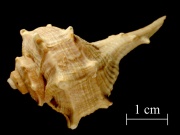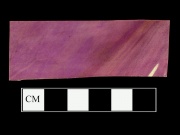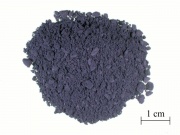Difference between revisions of "Murex purple"
| Line 1: | Line 1: | ||
| − | [[File:murex brandaris_1.jpg|thumb|Shell | + | [[File:murex brandaris_1.jpg|thumb|Shell (''Murex brandaris'')]] |
| − | |||
| − | (''Murex brandaris'')]] | ||
== Description == | == Description == | ||
A purple dye obtained from marine gastropods of the genus Murex (such as ''Murex brandaris'' L. and ''Purpura lapillus'' L.) found on the shores of the Mediterranean Sea and the Atlantic coast of Europe and the British Isles. Murex purple, also called Tyrian purple and red whelk, was used in Greek and Roman times for dyeing togas and in the Middle Ages for decorating manuscripts. The mollusks secrete a yellowish liquid that oxidizes to a purplish red in bright sunlight. One mollusk only produces one drop of colorant so large numbers were needed to produce enough dye for an entire cloth. Hence, the dye was very expensive. When a synthetic coal tar dye of the same composition (6,6'-dibromoindigo) was developed in 1904, the natural material became obsolete. | A purple dye obtained from marine gastropods of the genus Murex (such as ''Murex brandaris'' L. and ''Purpura lapillus'' L.) found on the shores of the Mediterranean Sea and the Atlantic coast of Europe and the British Isles. Murex purple, also called Tyrian purple and red whelk, was used in Greek and Roman times for dyeing togas and in the Middle Ages for decorating manuscripts. The mollusks secrete a yellowish liquid that oxidizes to a purplish red in bright sunlight. One mollusk only produces one drop of colorant so large numbers were needed to produce enough dye for an entire cloth. Hence, the dye was very expensive. When a synthetic coal tar dye of the same composition (6,6'-dibromoindigo) was developed in 1904, the natural material became obsolete. | ||
| − | [[File: | + | [[File:purpura lapillus1.jpg||thumb|Vellum dyed with Tyrian purple]] |
| − | |||
| − | |||
== Synonyms and Related Terms == | == Synonyms and Related Terms == | ||
6,6'-dibromoindigo; ''Murex brandaris; Purpura lapillus; Tethys norfolkensis;'' Violet snails; ladder shells (''Epitonium australe''); Purpur (Deut.); pourpre (Fr.); púrpura (Esp.); porfyra (Gr.); porpora di Tiro (It.); slakkerpurper (Ned.); Keizerspurper (Ned.); púrpura (Port.); Tyrian purple; Byzantium purple; Grecian purple; purple of the ancients; whelk red; ostrum; purpurissum; imperial purple; Royal blue | 6,6'-dibromoindigo; ''Murex brandaris; Purpura lapillus; Tethys norfolkensis;'' Violet snails; ladder shells (''Epitonium australe''); Purpur (Deut.); pourpre (Fr.); púrpura (Esp.); porfyra (Gr.); porpora di Tiro (It.); slakkerpurper (Ned.); Keizerspurper (Ned.); púrpura (Port.); Tyrian purple; Byzantium purple; Grecian purple; purple of the ancients; whelk red; ostrum; purpurissum; imperial purple; Royal blue | ||
| − | == | + | == Physical and Chemical Properties == |
| − | Insoluble in organic solvents and water. Unaffected by alkalis. The color is lightfast except when exposed to nitric acid or chlorine bleaches. | + | * Insoluble in organic solvents and water. |
| − | + | * Unaffected by alkalis. | |
| − | + | * The color is lightfast except when exposed to nitric acid or chlorine bleaches. | |
| − | + | * CAS = 17670-06-3 | |
| − | |||
| − | |||
| − | |||
== Additional Information == | == Additional Information == | ||
| Line 29: | Line 22: | ||
° J.K.Allan, Tyrian Purple: An Ancient Industry, ''Australian Museum Magazine'', 1934, 5(5), pp. 147-151. | ° J.K.Allan, Tyrian Purple: An Ancient Industry, ''Australian Museum Magazine'', 1934, 5(5), pp. 147-151. | ||
| − | + | [[File:dibromoindigo_1.jpg|thumb|Powdered dibromindigo]] | |
| − | |||
| − | |||
| − | File: | ||
| − | |||
| − | |||
| − | |||
| − | |||
== Sources Checked for Data in Record == | == Sources Checked for Data in Record == | ||
Revision as of 08:43, 11 June 2020
Description
A purple dye obtained from marine gastropods of the genus Murex (such as Murex brandaris L. and Purpura lapillus L.) found on the shores of the Mediterranean Sea and the Atlantic coast of Europe and the British Isles. Murex purple, also called Tyrian purple and red whelk, was used in Greek and Roman times for dyeing togas and in the Middle Ages for decorating manuscripts. The mollusks secrete a yellowish liquid that oxidizes to a purplish red in bright sunlight. One mollusk only produces one drop of colorant so large numbers were needed to produce enough dye for an entire cloth. Hence, the dye was very expensive. When a synthetic coal tar dye of the same composition (6,6'-dibromoindigo) was developed in 1904, the natural material became obsolete.
Synonyms and Related Terms
6,6'-dibromoindigo; Murex brandaris; Purpura lapillus; Tethys norfolkensis; Violet snails; ladder shells (Epitonium australe); Purpur (Deut.); pourpre (Fr.); púrpura (Esp.); porfyra (Gr.); porpora di Tiro (It.); slakkerpurper (Ned.); Keizerspurper (Ned.); púrpura (Port.); Tyrian purple; Byzantium purple; Grecian purple; purple of the ancients; whelk red; ostrum; purpurissum; imperial purple; Royal blue
Physical and Chemical Properties
- Insoluble in organic solvents and water.
- Unaffected by alkalis.
- The color is lightfast except when exposed to nitric acid or chlorine bleaches.
- CAS = 17670-06-3
Additional Information
° A. Wallert, Studies in Conservation, 40, pp. 17-188, 1995.
° J.K.Allan, Tyrian Purple: An Ancient Industry, Australian Museum Magazine, 1934, 5(5), pp. 147-151.
Sources Checked for Data in Record
- R. J. Gettens, G.L. Stout, Painting Materials, A Short Encyclopaedia, Dover Publications, New York, 1966
- G.S.Brady, Materials Handbook, McGraw-Hill Book Co., New York, 1971 Comment: p. 337
- Ralph Mayer, A Dictionary of Art Terms and Techniques, Harper and Row Publishers, New York, 1969 (also 1945 printing)
- Matt Roberts, Don Etherington, Bookbinding and the Conservation of Books: a Dictionary of Descriptive Terminology, U.S. Government Printing Office, Washington DC, 1982
- Thomas B. Brill, Light Its Interaction with Art and Antiquities, Plenum Press, New York City, 1980
- The Dictionary of Art, Grove's Dictionaries Inc., New York, 1996 Comment: "Pigments"
- Susan E. Schur, Conservation Terminology: A review of Past & Current Nomenclature of Materials, Technology and Conservation, Spring (p.34-39); Summer (p.35-38); Fall (p.25-36), 1985


